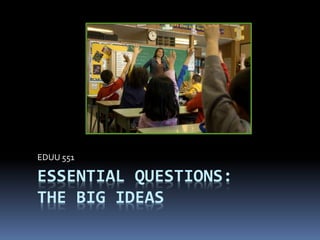
Eduu 551 Essential Questions and Integrating Technology
- 1. ESSENTIAL QUESTIONS: THE BIG IDEAS EDUU 551
- 2. ESSENTIAL QUESTIONS BLOOM'S TAXONOMY DEPTH OF KNOWLEDGE (DOK) UNDERSTANDING BY DESIGN BACKWARDS DESIGN ESSENTIAL QUESTIONS SAMR, TPACK, DOK, AND BLOOM’S
- 3. Bloom’s Thinking Levels Ask students to demonstrate: Knowledge - recall information in original form Comprehension - show understanding Application - use learning in a new situation Analysis - show s/he can see relationships Synthesis - combine and integrate parts of prior knowledge into a product, plan, or proposal that is new Evaluation - assess and criticize on basis of standards and criteria 1956
- 4. Remembering Understanding Applying Analyzing Evaluating Creating • Creating – designing, constructing, planning, producing, inventing, devising, making • Evaluating – checking, hypothesizing, critiquing, experimenting, judging, testing, detecting, monitoring • Analyzing – comparing, organizing, deconstructing, attributing, outlining, finding, structuring, integrating • Applying – implementing, carrying out, using, executing • Understanding – interpreting, summarizing, inferring, paraphrasing, classifying, comparing, explaining, exemplifying • Remembering – recognizing, listing, describing, identifying, retrieving, naming, locating, finding Bloom’s Revised Taxonomy
- 7. • Level 3: Strategic Thinking • Level 4: Extended Thinking • Level 2: Skill Concept • Level 1: Recall Memorize Identify Report Define Draw Use Name Match Measure List Label Illustrate What Where When Why Recognize Repeat Recite InferCategorize Collect Display Graph Classical Separate Cause & Effect Estimate Compare Summarize Revise Assess Construct Investigate Develop Logical Argument Hypothesize Explain Critique Cite Evidence Design Connect Synthesize Apply Concepts Critique Analyze Create Prove
- 8. DOK Level 1: Common Core State Standards (CCSS) Recall and Reproduction: Level 1 DOK 1 requires recall of information, such as a fact, definition, or term, or performance of a simple process or procedure. Memorize Identify Report Define Draw Use Name Match Measure List Label Illustrate What Where When Why Recognize Repeat
- 9. DOK Level 2: Common Core State Standards (CCSS) Skills and Concepts: Level 2 DOK 2 includes the engagement of some mental processing beyond recalling or reproducing a response. Items require students to make some decisions as to how to approach the question or problem. Infer Relate Categorize Collect Show Display Graph Classify Separate Cause /Effect Estimate Distinguish Compare Summarize
- 10. DOK Level 3: CCSS Strategic Thinking: Level 3 DOK 3 requires deep understanding as exhibited through planning, using evidence, and more demanding cognitive reasoning. The cognitive demands at Level 3 are complex and abstract. Revise Assess Investigate Develop Logical Argument Hypothesize Explain Critique Cite Evidence Draw Conclusions Formulate Construct
- 11. DOK Level 4: CCSS Extended Thinking: Level 4 DOK 4 requires high cognitive demand and is very complex. Students are expected to make connections – relate ideas within the content or among content areas – and have to select or devise one approach among many alternatives on how to solve the problem. Design Connect Synthesize Apply Concepts Critique Analyze Create Prove
- 12. Framing Essential Questions Essential Questions at the top of Bloom’s Taxonomy Create - innovate Evaluate – make a thoughtful choice between options, with the choice based on a clearly stated criteria Synthesize – invent a new or different version Analyze – develop a thorough and complex understanding through skillful questioning.
- 13. Essential Questions: EQs Spark our curiosity and sense of wonder Desire to understand Something that matters to us Answers to EQs can NOT be found Students must construct own answers Make their own meaning from information they have gathered Create insight
- 14. Essential Questions Answering such questions may take a lifetime! Answers may only be tentative Information gathering may take place outside of formal learning environments Engage students in real life applied problem solving EQs lend themselves to multidisciplinary investigations.
- 15. Ideal Essential Questions Framed by students themselves Best to start with subsidiary questions that might help support the main question Formulate categories of related questions “What else do we need to know? State suppositions Hypothesizing and Predicting Thought process helps provide a basis for construction of meaning.
- 16. Understanding by Design What are the big ideas? Core concepts Focusing themes On-going debates/issues Insightful perspectives Illuminating paradox/problem Organizing theory Overarching principle Underlying assumption What’s the evidence? How do we get there? Represent a big idea having enduring value beyond the classroom Reside at the heart of the discipline (involve “doing” the subject) Uncover abstract misunderstood ideas Engaging Students Enduring Understanding
- 17. Understanding by Design Desired Results:What will the student learn? Acceptable Evidence: How will you design an assessment that accurately determines if the student learned what he/she was supposed to learn? Lesson Planning: How do you design a lesson that results in student learning? Identify desired results Determine acceptable evidence Plan learning experiences and instruction
- 18. Understanding by Design Will this lesson lead to enduring understanding? Worth being familiar with Important to know and do Enduring Understanding
- 19. Understanding by Design Performance tasks and projects Open-ended Complex Authentic Summative Culminating Activity Project Product or Publication Performance or Presentation Exhibition Performance tasks and projects need assessments that are more authentic than traditional quizzes and tests.
- 21. The SAMR Model
- 22. The SAMR Model
- 24. The SAMR Model and Bloom’s
- 26. SAMR,TPCK, DOK, and Bloom’s
